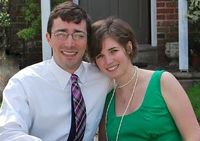Meet a StudentMarch 15, 2011
Jere Scott Bradshaw, MDiv student, pastoral emphasis (pictured with his wife, Dorothy) Why did you come to Westminster? We are specifically attracted to Westminster because of the counseling department, the academically rigorous environment, and the city of Philadelphia. We find Westminster's reputation for academic excellence, combined with its emphasis on practical ministry, to offer an unparalleled environment for theological education. After our first year here (my wife is in the MA counseling program), we both agreed that our marriage was better because of the Lord’s work in our lives through Westminster. Were there any professors that influenced your decision to come here? What are some of your hopes for after graduation? During the Civil War, Joshua Chamberlain had the academic degrees to receive a higher rank, but he knew he didn’t have the proper military training. So he refused to take the position until he could train under a West Point General. Humility prepared him for the most decisive battle of the war. In a similar manner, I hope to be trained by soldiers in the army of the Lord in how to connect the riches of Christ to the realities of life. How have you found the Westminster education beneficial, not only for knowledge about the scriptures, but also for practical knowledge? Consequently, practical matters, like how I relate to my wife on a day to day basis, have been transformed by the way I learned Hebrew. What are your interactions with other students like? How have you found the mentored ministry program here? What would you say to someone who is considering possibly going into seminary? One, do they have an internal call with an external call? Is there anyone else that agrees that they should go to seminary (especially in the church: elders, pastors)? Do you have a support team that will pray, encourage, and contribute to your needs? Why would you go through seminary alone, if you believe in a covenant community? Two, what’s their vision for seminary? Remember this is a Masters and/or PhD level education that will require a good deal of work. Do you need the degree to serve our King? Third, don’t start building without counting the cost. Are you prepared for the financial costs of coming to school? Do you need to take care of your current financial obligations before you come to Westminster? What would you say to a first-year student about the work that they are doing? Also, recognize that your education is a privilege. You are learning about the glorious way God saves sinners. This great salvation in Christ is our foundation for each day and our motivation for each duty. As Warfield said, “no religious character can be built up on the foundation of neglected duty… And you will never prosper in your religious life in the Theological Seminary until your work in the Theological Seminary becomes itself to you a religious exercise out of which you draw every day enlargement of heart, elevation of spirit, and adoring delight in your Maker and your Savior.” May the knowledge of our God cover the earth as the waters cover the sea. |






